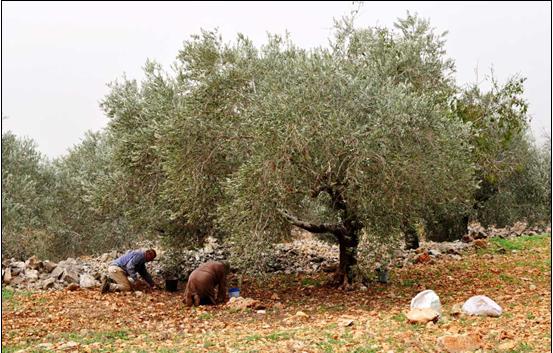This fall, Palestinian farmers need your support. September is here and as the annual olive harvest approaches, the olives, green, purple, and black, are growing plump and ripening, in the occupied West Bank. “Of course, those olives are on the trees that have not been chopped down, burned, or poisoned by settlers,” said Zakaria Sadah, Director of Field Work in the Palestinian Occupied Territories for Rabbis for Human Rights (RHR).
According to Sadah “For over a decade now I have worked with RHR’s dedicated staff and rabbis. Together we have established successful strategies to ensure that Palestinian farmers are able to safely and completely harvest their olives. We recruit dozens of volunteers — Jewish, Israeli, and international — to pick side by side in solidarity and friendship with Palestinian farmers. The presence of the volunteers is a moving show of respect and fellowship that also, critically, deters extremists from violence and threats. RHR also serve as liaisons with the Israeli army, ensuring the farmers are permitted to enter their groves as guaranteed by Israeli law. Over the years, my Palestinian friends, family, and neighbors have come to trust Rabbis for Human Rights, and they do not hesitate to let us know their needs.”
The olive harvest is supposed to be a time of joy and community cooperation for Palestinians. Women, men, and children come together in the fields and accompany the hard work with songs, laughter, and food. Afterwards, Palestinians gather at small local olive presses and turn the bitter fruit into savory table olives, fragrant olive oil, and olive soap. “But for farmers in Area C who have found their historical lands increasingly encroached upon by settlements and outposts and threatened by violent settlers, the harvest is a time of worry and anxiety. Will the masik proceed unhindered? Will the olives be stolen? Will guns be brandished and assaults made? Who will be hurt —or worse — this year?” Sadah questioned.
In 2016, the UN body OCHA recorded 26 incidents of harvest-related settler violence and property damage. This number is down from 33 in 2015, “but for those of us who value human rights, and especially for us Palestinians, this is 26 incidents too many. Hundreds and even thousands of trees are destroyed each year.”
Last year RHR brought out 130 volunteers for 16 days of hard work harvesting and sorting olives. “This October we will continue this tradition, but the costs increase and become harder to cover: There are buses to book for our volunteers, gas to purchase, drivers to pay, and staff expenses. Each day in the field can easily cost upwards of $800. We are so grateful for each donation, in any amount, but if forty of you can commit to $108 dollars each that will cover the total bus expenses for eight full days of harvesting in the West Bank. Rest assured your contribution will truly make a difference to farmers from villages such as Burin, Awarta, Yassuf and Jit — the village where I myself was born and now raise my young family.”



